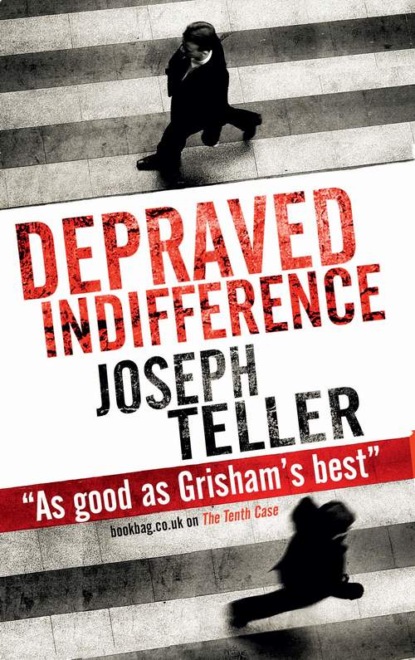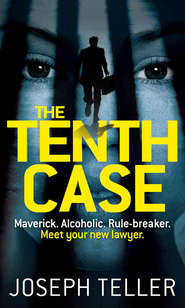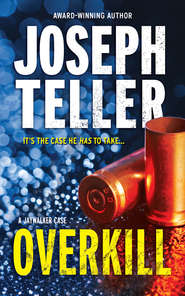По всем вопросам обращайтесь на: info@litportal.ru
(©) 2003-2024.
✖
Depraved Indifference
Автор
Год написания книги
2018
Настройки чтения
Размер шрифта
Высота строк
Поля
Chapter Two
Jaywalker, P.I.
Which, of course, immediately changed everything.
A drunk-driving case is only a drunk-driving case. Until someone dies. When that happens, it blossoms into a vehicular homicide. When nine someones die, it can become a full-blown murder case, especially when the victims are incinerated after the van in which they’re riding gets forced off the road, flips three times and explodes.
Jaywalker knew the case. Who didn’t? It had led off the evening news, even made the front page of his beloved New York Times, about three weeks ago. The driver of a passenger van had been literally run off the road and down a steep embankment by an oncoming Audi sports car speeding in the wrong lane. It had happened just north of Congers, New York, right before Route 303 ended and joined up with Route 9W. A witness in a pickup truck had seen the whole thing. He’d thought briefly about giving chase to the Audi as it sped off, before deciding instead to stop to see what he could do for the victims.
The answer was nothing.
Within minutes, the van had burned so badly that the newspaper photographs of it revealed only a portion of the lettering painted onto its side. All that remained visible was—MAZ—ESHI—, a fact that quickly gave birth to a rumor that the occupants had been Muslim terrorists who’d accidentally blown themselves up before reaching their intended target. That rumor was soon replaced by another one, that the van had been overcrowded because it had been carrying migrant Mexican farmworkers, who were no doubt illegal aliens.
The right-wing radio talk-show hosts lost no time in picking up the story. To them and their call-in listeners, it didn’t seem to matter too much whether the dead were terrorists or illegals; whichever turned out to be the case, the consensus was that they’d pretty much deserved their fate. “Good for that Audi guy!” said one caller. “Maybe that’ll teach them criminal alien bombers a lesson!” Before the hour was up, one host was referring to the driver of the car as the “Audi Avenger.”
It was only after emergency responders had succeeded in putting out the fire and extricating the bodies that the grim truth was discovered. Eight of the nine dead, the van’s driver being the sole exception, were young children whose ages would eventually be determined to range from six to eleven. All had been students at the Ramaz Yeshiva, a Jewish school located fifteen miles from the site of the impact. They’d been heading to a groundbreaking ceremony for a new synagogue over in Haverstraw.
Just like that, the Audi Avenger became the Audi Assassin.
If the driver of the pickup truck had been unable to help the occupants of the van, at least he’d accomplished something that day. Turning to watch the fleeing Audi, he’d managed to not only note the model but read its license plate, and although he’d forget the complete registration before being interviewed by state troopers, he’d distinctly remembered that it ended with the numbers 724. That happened to be his wife’s birth date, July 24.
The following day, even as computers were busy searching data files for all Audis and Audi look-alikes in the tristate area with registrations ending in 724—there were only six, it would turn out—a man by the name of Carter Drake III, accompanied by his business attorney, turned himself in to the New York State Police in Nyack. Drake was forty-four and had no prior arrests. That said, he’d allowed his driver’s license to lapse over parking tickets he’d accumulated several years ago, along with the insurance on the Audi.
Congers is a one-stoplight village in Rockland County, a half an hour north of the George Washington Bridge, on the Jersey side. The county seat is New City, which means that all felonies end up there for trial. But New City has another distinction. It happens to be home to one of the largest concentrations of Orthodox-Jewish populations in the western hemisphere.
Like his wife, Amanda, Carter Drake happened to be blond, good-looking and decidedly not Jewish, let alone orthodox.
Not exactly the best fit for New City.
“So,” said Amanda, “will you represent my husband? I’m pretty sure we can afford your fee.”
Jaywalker was pretty sure that was an understatement. “You’re forgetting my suspension,” he reminded her.
“No, I’m not,” Amanda assured him. “You told me yourself you like to cut corners, break silly rules, take risks. What’s a little suspension between friends? Besides which, doesn’t it take months and months for a case to go to trial? By that time, you’ll be relawyerized.”
“Reinstated,” Jaywalker corrected her.
“Whatever. And Carter’s no dummy. He can always get sick or something, if the case needs to be slowed down. If you know what I mean.”
Jaywalker nodded. Of course he knew what she meant. It was the kind of delaying tactic he himself had resorted to more than once. A bit devious, to be sure. But deviousness had its place in Jaywalker’s bag of tricks. So it certainly wasn’t Amanda’s suggestion that was bothering Jaywalker at the moment. Still, something was. And he decided it was the nagging feeling that he was being set up.
Because the thing was, long before their revolving-door encounter, Jaywalker had noticed that he was being followed. Not by a car; his ancient beat-up Mercury, the one he’d bought himself for six hundred dollars several years back as a reward for winning a brief but serious bout with the bottle, was rusting away in a parking lot over on Twelfth Avenue. No, on foot. Someone had been tailing him, lingering back in the shadows, walking when he walked, stopping when he stopped, crossing the street when he crossed.
Had it not been for his days as a DEA agent, it’s likely Jaywalker never would have picked it up. But so many of his colleagues had been doing something wrong back then, whether that meant something as minor as a little bit of creative writing on the hours entered on their Daily Activity Logs, all the way up to outright stealing or selling the very narcotics they were paid to keep off the streets. Whatever it was, they were constantly checking for a tail, as they used to call it. Over time, Jaywalker had found himself gradually adopting their paranoia as his own, almost unconsciously looking over his shoulder as he walked and glancing in the rearview mirror as he drove. Even after he’d left the job, the habit had proved a hard one to kick, and now, years later, it still stayed with him to a certain extent.
So yesterday afternoon, when he thought he’d spotted someone eyeing him through sunglasses from outside the plate-glass window of the Korean grocery where he was buying pretzels, cheese and other essentials, he’d decided to conduct a little experiment. He’d proceeded to walk two full avenues out of his way, all the way from West End to Amsterdam, before abruptly stopping in the middle of the intersection, slapping his head in an exaggerated fashion as though he’d forgotten something and suddenly doubling back toward Broadway.
And he’d been right.
Somewhat to his surprise, it had turned out to be a woman, a thirty something blonde almost as tall as he was. Though it was an overcast day, she was wearing sunglasses. And as soon as he looked her way, she averted her glance, turned away and crossed the street, disappearing into the midafternoon crowd.
He’d looked for her again this morning and had actually been disappointed when he’d failed to spot her. But soon enough, there she was again. More careful this time, wearing a large hat pulled down over her forehead, hanging back a little farther, even following him from across the street at one point. But Jaywalker had tricks of his own. In order to get a better look at her, he’d stopped in front of a stationery store and pretended to study the items on display. In fact, he was able to angle himself so that in the reflection of the glass he could see her slow down and then stop on the opposite sidewalk, pretending to be looking into a shop herself. But it was unlikely: the shop she was staring into bore the name, at least in Jaywalker’s mirrored view, In unmirrored English, that would be PAYCHECKS CASHED, and she definitely didn’t look like the type who needed her paycheck cashed.
He could have lost her right then, had he wanted to. But by that time he was curious. For starters, unlike his old DEA cronies, Jaywalker knew he wasn’t doing anything wrong. He’d faithfully abided by the terms of his suspension. He’d given up his law office, which had never been more than a desk, a phone, an answering machine and a computer in a tenth-floor suite. He’d stayed away from 100 Centre Street, Foley Square and all the other courthouses of the city. He’d stopped giving out business cards, refrained from offering legal advice to the few friends and family members he had, and quickly corrected anyone who addressed him or referred to him as a lawyer, attorney, counselor-at-law, or anything else that suggested he was still practicing. Beyond taking those precautions, he lived a life that was almost boring in its adherence to the law. With his car in dry dock, he accumulated no speeding or parking tickets. Without an income, he had no taxes to cheat on. If he broke the law at all, he excused his transgressions as the inevitable by-product of his name: as a pedestrian he continued to pay little heed to hatched crosswalks, traffic lights, and WALK and DON’T WALK signs. But those offenses were hardly the stuff that called for the authorities to go out and recruit Mata Hari types to conduct clandestine surveillance on him.
So who was this blonde who was following him, if rather amateurishly? Jaywalker had been determined to find out. So he’d gradually led her, looking back only surreptitiously, and only often enough to make certain she was still there, all the way to the main branch of the public library. There he’d mounted the outer flight of steps and entered through one of the revolving doors. From the darkened interior, he’d watched as she’d climbed the steps in pursuit. Then, as soon as she’d stepped inside one of the four sections of the door, he’d gotten in opposite her and jammed the thing with his foot. Only after he’d gotten a good look at her from up close—and liked what he saw—had he given the door a good shove to get it going again. Unfortunately, she must have been pushing at the same time, and their combined efforts, as he released his foot, had literally knocked her to the ground. Which meant that, being a gentleman, Jaywalker had had no choice but to come around to her side and help her to her feet.
Her hat had somehow stayed in place, but the force of her fall had knocked the sunglasses from her face. He picked them up and held them up to his eyes for inspection.
“No damage,” he assured her.
What he’d really been doing, of course, was checking to see if they were prescription and therefore necessary on a day that was, if anything, even more overcast than the previous one. They weren’t, meaning they were nothing but a prop. Still, Jaywalker hesitated a bit longer before returning them to her, getting an even better look at her.
That had been an hour and a half ago. The chat on the library steps, the cup of coffee in a nearby luncheonette and the cab ride to her place had taken less than an hour. The rest, as they say, was history. Yet at no point had Jaywalker confronted her about having followed him. Instead, he’d allowed her the fiction that they’d met only because he’d happened to knock her down.
He decided she must have known who he was all along. Her “You’re that guy!” epiphany had been nothing but an act, meant to convince him that it had been pure serendipity that she’d ended up in bed with just the man she wanted to defend her husband.
Why had she gone to such elaborate lengths to meet him? If the answer to that question still went begging, Jaywalker could come up with a pretty plausible explanation. Immediately following his suspension, he’d vacated his office, disconnected his phone, canceled his e-mail account and all but ignored whatever showed up in his post office box. His home phone number, as it always had been, remained unlisted. In other words, he’d become a phantom, a very difficult man to find. Had Amanda Drake—now that he knew her real name—used more traditional means to try to meet with him and hire him, she no doubt would have failed. So she’d somehow hunted him down and then resorted to the old follow-him-until-he-catches-me trick. Then she’d lured him into her bed and, coming up for air, innocently asked him what he did for a living. So while Jaywalker was forced to deduct one point for her having been less than forthright, he gave it back to her for sheer cleverness.
A woman after his own heart.
Even though he was pretty much satisfied with his explanation of why Amanda had been following him, he was tempted to come right out and ask her. Not so much to test his hypothesis as to show off his own superior instinct and skill at having spotted her. But he resisted the urge. Some cards are better played early on in the game; others are best held on to. Who knew if an opportune moment might arise when confronting Amanda would pay a dividend? So he’d settle for having made the tail, in more ways than one.
He kept quiet, therefore, and turned his thoughts to the notion of getting back into the business of defending criminals—okay, accused criminals. And the love-hate relationship he’d long carried on with the way he’d been making his living for the past twenty-some years.
As much as he’d been enjoying his extended sabbatical from the law, Jaywalker could feel the pull of getting back into the trenches. He missed the courthouse, that filthy place of long lines, broken elevators and peculiar smells. He missed the people, the camaraderie—defense lawyers and prosecutors he’d grown middle-aged with; judges who itched to hold him in contempt every time he stepped across some foolish line they’d drawn, but would have hired him in a New York minute if they themselves had gotten into trouble; court officers, corrections officers, clerks, court reporters and translators he’d come to feel he’d known forever. He missed even the defendants, often initially surly or even hostile, invariably self-destructive, but almost always deeply appreciative by the time he parted ways with them. He missed the battle, that matching of wits, that take-no-prisoners struggle they called a trial but might just as well have called a war. He missed opening statements, cross-examination, summing up. He missed sitting on the edge of his seat and feeling his heart pounding in his chest as the jurors filed into the courtroom one last time to deliver their verdict. He missed the incredible high that lifted him into the stratosphere with each acquittal. He even missed, in some strange way, the depths of despair into which he plunged following a conviction.
What’s more, Jaywalker found himself intrigued by the case against Carter Drake. Should the act of driving, no matter how poorly or even recklessly, ever be a sufficient predicate for a murder charge and the mandatory sentence of life imprisonment it carried? Was Jaywalker being old-fashioned by thinking that before accusing a man of murder, the state ought to first be required to demonstrate that he’d set out to harm somebody? Was that asking too much?
But beyond Jaywalker’s interest in that legal issue, there was a much more mundane reason for wanting to get involved. And that was the worst invention Homo sapiens had ever managed to come up with. Money. A murder case, even one predicated upon the faulty operation of a motor vehicle, meant a five-figure fee. God knew he could use the money, which would be his first income in more than two years. And since Carter Drake was apparently willing to do whatever it would take to drag the case out until Jaywalker’s suspension was over, things might actually work out. He’d have to be careful, of course. He’d have to steer clear of the New City courthouse, refrain from saying anything about the case that might find its way into the newspapers and avoid any conduct that might arguably constitute practicing law. And if he were to accept any money, he’d have to do it in such a way as to make it look like something other than a legal fee. But that could be done, he was pretty sure.
Then there were the secondary drawbacks and benefits of getting involved. On the negative side was the sheer notoriety of the case. Taking on Carter Drake as his comeback act would mean that Jaywalker would be returning to the scene of his past transgressions with a considerable bang. Right off the bat, he’d be representing a high-profile murder defendant in what was sure to be a media-circus trial. The prospect of that kind of free publicity would no doubt have delighted every one of Jaywalker’s colleagues, but in that respect he stood apart from them. In fact, the thought of it brought him dangerously close to gagging.
Finally, there was the chance that one of the benefits of representing Carter Drake might be Amanda Drake. Then again, what a conflict of interest that would be! Jaywalker allowed himself a chuckle as he imagined a slew of new charges from the disciplinary committee. He could picture the presiding justice snarling down at him with righteous indignation. “So, Mr. Jaywalker, we conclude that you deliberately made certain that your client would remain locked up for as long as possible, just so you could continue to have an affair with his wife.”
Well, that was one benefit that might just have to be curtailed. But what a shame.
That night, in the privacy of his own place, Jaywalker thought things over. Unlike Amanda Carter’s four-bedroom triplex just off Fifth Avenue, Jaywalker’s apartment wasn’t much more than a furnished room. What it was, was a fourth-floor walk-up studio in what real estate agents tend to write off as a developing neighborhood, much the same way economists might refer to a developing nation. Implicit in both terms is the suggestion that the entity being described still has a long way to go before qualifying for actually being developed. So as he pondered the advisability of getting involved in Carter Drake’s case, Jaywalker stretched out on his sofa, which doubled as his bed, and also served from time to time as his laundry sorter, work surface and exercise mat.
A criminal case begins, as Jaywalker well knew, with an investigation, followed by an arrest. Or sometimes it’s the other way around, an arrest followed by an investigation. By the time a defense lawyer gets contacted, selected, and either hired by the family or appointed by the court, that lawyer already finds himself playing catch-up. It had already been three weeks since Carter Drake’s arrest, and based upon the little that Jaywalker remembered from the newspaper accounts, the only representation Drake had had in that time was from the business lawyer who’d surrendered him, followed by some local guy who’d stood up for him when he got to court. It would be another seven or eight months before Jaywalker would be allowed to practice again. That would mean an eight-month head start for the prosecution, an all but insurmountable advantage.
So what was Jaywalker to do in the meantime? He couldn’t contact the D.A.’s office or the state police, or risk calling either of the lawyers who’d been representing Drake; any one of them could turn him in for doing so. Yet he couldn’t just sit on his hands and watch his future client languish in the hands of a couple of incompetents while the prosecution perfected its case, could he?
He found a half-smoked joint, fired it up and inhaled deeply. Ever since he’d given up drinking, Jaywalker had resorted to the old devil weed for occasional inspiration. It soothed him, relaxed him, helped him see things a bit more clearly, and brought on a moderate case of the “munchies”—an indispensable aid to a man who, to the envy of most men and every woman he knew, had serious trouble keeping his weight up. With no known adverse side effects and no possibility of a lethal overdose, it was, as Martha Stewart might have put it, a good thing. Little wonder, thought Jaywalker, that the government had criminalized it, or that the last administration had chosen to make it the primary target of its war against drugs.
It didn’t take long for Jaywalker to hatch a plan. What he’d do would be to have Amanda hire him as a private investigator for her husband. That would allow Jaywalker to go into jail and talk with Drake, gather police reports and other documents, locate and interview witnesses, and generally snoop around. His DEA background more than prepared him for the job, and his law degree qualified him, much the same way it permitted lawyers to act as real estate brokers and notary publics without having to undergo additional training or licensing. It was all part of the genius behind the scheme of having laws that are written by lawyers, enforced by lawyers who’ve become judges, for the benefit and protection of lawyers.
Now, did the little matter of Jaywalker’s suspension disqualify him from availing himself of those benefits and protections? No, he decided; that would be overthinking it. He was still a lawyer, albeit one who was temporarily incapacitated. Kind of like how a baseball player who was on the disabled list was still a baseball player, no? A perfect analogy. So as long as Jaywalker were to stick to investigating, he wouldn’t really be practicing law, would he be?








